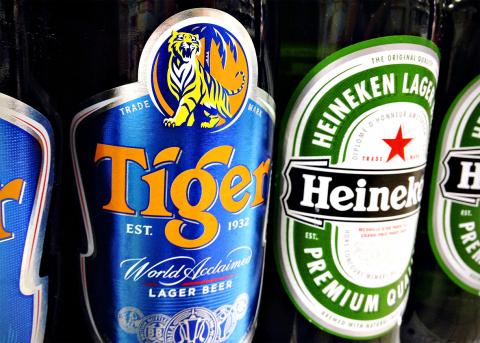Dutch beer giant Heineken yesterday moved one step closer to a US$4.6 billion takeover of top Asian brewer APB when it gained the backing of a Thai rival ahead of a vote on the issue.
Thai Beverage (ThaiBev) and TCC Assets, both controlled by tycoon Charoen Sirivadhanabhakdi, said in a joint statement with Heineken that they would support the Dutch firm’s bid to gain control of Asia-Pacific Breweries (APB).
Heineken in turn promised not to make a counter-offer for APB’s parent company Fraser and Neave (F&N), which the Thais want to take over.

Photo: Reuters
“Heineken is now in touching distance of acquiring APB after this surprise backdown by ThaiBev,” said Justin Harper, an analyst with IG Markets Singapore. “There will be a huge sigh of relief coming from Holland [the Netherlands] this morning.”
Heineken already owns 42 percent of Singapore-based APB and offered S$5.6 billion (US$4.6 billion) for the 40 percent stake held by F&N.
This has to be ratified at an extraordinary general meeting of F&N shareholders on Sept. 28.
Until yesterday’s compromise was announced, Heineken’s bid was in doubt after ThaiBev and TCC Assets, which jointly own 30 percent of F&N, last week offered other owners S$8.7 billion to take over the group.
In the joint statement to the Singapore Exchange, the Thais promised to vote in favor of Heineken’s offer, while the Dutch brewer said it “irrevocably undertakes not to make a general offer” for F&N, in which it has no stake.
APB, the crown jewel of F&N, makes Tiger Beer and other popular brands in Asia, where beer consumption is rapidly growing as sales taper off in mature markets like Europe, Heineken’s traditional base.
ThaiBev makes Chang Beer and is also involved in food and non-alcoholic drinks.
A Heineken takeover of APB would give it an edge over other rivals in Southeast Asia as well as China.
Beer consumption in nine of the 10 Southeast Asian countries totaled 6.84 billion liters last year, up more than 6 percent from 2010, with Vietnam, Thailand and the Philippines leading the market, data from research firm Euromonitor showed.

The Eurovision Song Contest has seen a surge in punter interest at the bookmakers, becoming a major betting event, experts said ahead of last night’s giant glamfest in Basel. “Eurovision has quietly become one of the biggest betting events of the year,” said Tomi Huttunen, senior manager of the Online Computer Finland (OCS) betting and casino platform. Betting sites have long been used to gauge which way voters might be leaning ahead of the world’s biggest televised live music event. However, bookmakers highlight a huge increase in engagement in recent years — and this year in particular. “We’ve already passed 2023’s total activity and

Nvidia Corp CEO Jensen Huang (黃仁勳) today announced that his company has selected "Beitou Shilin" in Taipei for its new Taiwan office, called Nvidia Constellation, putting an end to months of speculation. Industry sources have said that the tech giant has been eyeing the Beitou Shilin Science Park as the site of its new overseas headquarters, and speculated that the new headquarters would be built on two plots of land designated as "T17" and "T18," which span 3.89 hectares in the park. "I think it's time for us to reveal one of the largest products we've ever built," Huang said near the

China yesterday announced anti-dumping duties as high as 74.9 percent on imports of polyoxymethylene (POM) copolymers, a type of engineering plastic, from Taiwan, the US, the EU and Japan. The Chinese Ministry of Commerce’s findings conclude a probe launched in May last year, shortly after the US sharply increased tariffs on Chinese electric vehicles, computer chips and other imports. POM copolymers can partially replace metals such as copper and zinc, and have various applications, including in auto parts, electronics and medical equipment, the Chinese ministry has said. In January, it said initial investigations had determined that dumping was taking place, and implemented preliminary

Intel Corp yesterday reinforced its determination to strengthen its partnerships with Taiwan’s ecosystem partners including original-electronic-manufacturing (OEM) companies such as Hon Hai Precision Industry Co (鴻海精密) and chipmaker United Microelectronics Corp (UMC, 聯電). “Tonight marks a new beginning. We renew our new partnership with Taiwan ecosystem,” Intel new chief executive officer Tan Lip-bu (陳立武) said at a dinner with representatives from the company’s local partners, celebrating the 40th anniversary of the US chip giant’s presence in Taiwan. Tan took the reins at Intel six weeks ago aiming to reform the chipmaker and revive its past glory. This is the first time Tan